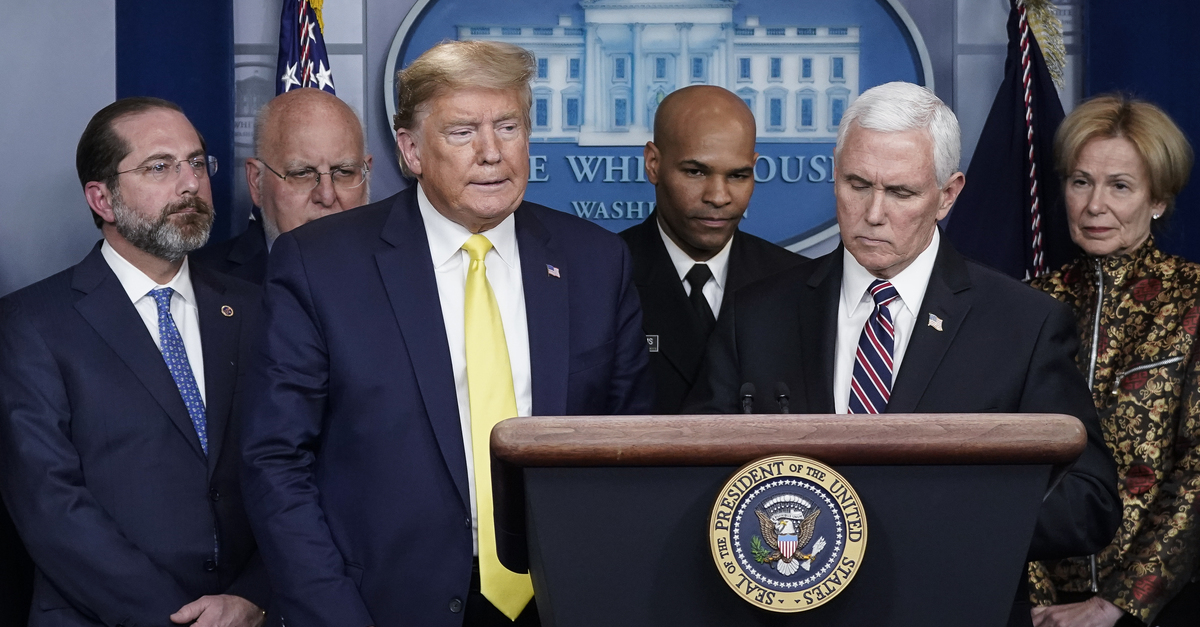
BuzzFeed News and reporter Jason Leopold filed a federal lawsuit on Tuesday accusing the Trump administration of violating the Freedom of Information Act (FOIA) by failing to produce documents relating to the administration’s coronavirus pandemic response.
The complaint, filed in the U.S. District Court for the District of Columbia, claims that several federal agencies failed to respond to FOIA requests within the time period specified under the law. The agencies named as defendants in the lawsuit are the Centers for Disease Control and Prevention (CDC), the Department of Health and Human Services (HHS), the Federal Emergency Management Agency (FEMA), the Food and Drug Administration (FDA), the National Institute of Health (NIH), and the Department of Homeland Security.
The lawsuit seeks records to verify several of President Donald Trump’s claims about his administration’s response to the coronavirus threat.
“Serious questions have been raised about the accuracy of a number of different statements made by the President and others in his administration and the adequacy of the federal government’s response, and for his part, the President has claimed that media reports covering the pandemic have been ‘fake’ and ‘minimized the risk’ of the virus ‘from the start,’ and filed, through his campaign organization, defamation suits against news outlets that have run COVID-19-related political ads,” the lawsuit stated. “Questions of this sort are the very reason the Freedom of Information Act exists, and the urgency of this information to the public is the reason the statute includes provisions for expedited processing—provisions that the Defendant agencies have failed to abide and that the Court should enforce on an accelerated basis in this case.”
For example, BuzzFeed is seeking all non-confidential emails to and from the CDC which mention or refer to the pandemic, as well as internal memos and talking points produced by the agency. What else might be uncovered? Perhaps some internal responses unflattering to the president. Note that the suit specifically seeks records mentioning or referring to Trump tweets, or mentioning coronavirus and the word “hoax”. Those records could be emails sent by chief scientists and doctors:
On March 15, 2020, Plaintiffs submitted a FOIA request to FDA for the following records from January 1, 2020, to the date the search is conducted:
[…]
any and all emails sent or received by the Office of the Commissioner, Office of the Executive Secretariat, Office of Clinical Policy Programs, Office of the Chief Scientist, Office of External Affairs, Office of Operations, Office of Policy, Legislation and International Affairs, Center for Biologics Evaluation and Research, Office of Vaccines, Research & Review, Center for Drug Evaluation and Research, [] mentioning or referring to Coronavirus/COVID-19 AND to any tweets by President Donald Trump mentioning or referring to Coronavirus/COVID-19 AND ‘HOAX.’ You may limit the search to the directors of each office and their deputies and the chief scientists/doctors. The timeframe of this search is January 22, 2020, through the date the search for responsive records is conducted.
You may recall that another FOIA suit once revealed harsh backlash by government scientists to Sharpie-gate. Something similar could play out here.
The news organization is asking a federal judge to declare the agencies in violation of FOIA and order them to conduct an immediate search for the requested records.
This was neither the first nor the second FOIA suit filed against the Trump administration amid the coronavirus pandemic.
See below for the latest filing.
Buzzfeed Lawsuit by Law&Crime on Scribd
[image via Drew Angerer/Getty Images]
Have a tip we should know? [email protected]